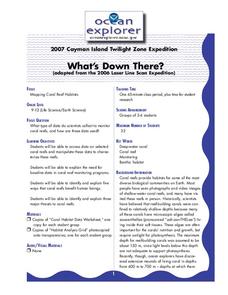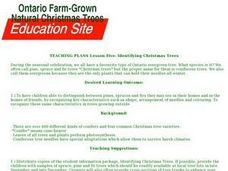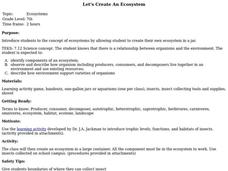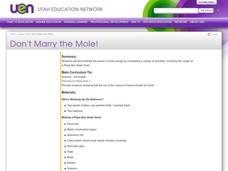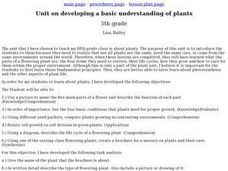Curated OER
Let's Make a Tubeworm!
Students discuss deep-sea chemosynthetic communities then create a poster of a three-dimensional tubeworm. In this creative lesson students create their own tubeworm and write a written report on it.
Curated OER
Monsters of the Deep
Students describe major features of cold seep communities and list the organisms that are typical in these communities. In this deep sea environment lesson students work in groups and research their given cold seep group.
Curated OER
What's Down There?
Students analyze data on coral reefs and use this to help characterize reefs. In this mapping coral reefs lesson students identify and explain the major threats to coral reefs.
Curated OER
Easy as Pi
Students describe the importance of structural features that increase surface area in a coral reef habitat. In this investigative lesson students quantify the impact of modifications on surface area in model habitats.
Curated OER
Where's My Bot?
Young scholars estimate geographic position based on speed and air travel. In GPS lesson students use GPS to estimate the set and drift of currents.
Curated OER
Plant Systems
In this plant systems worksheet, students write true or false for the 10 sentences about plant systems. Students then label the parts of the plant.
Curated OER
Cells Vocabulary Quiz
In this cells vocabulary learning exercise, students draw lines to match 12 words pertaining to cells to their meanings. Prior knowledge is assumed.
Curated OER
Plants Vocabulary Quiz
In this plant vocabulary worksheet, students draw lines to match 10 plant words with their meanings. Prior knowledge is assumed.
Curated OER
Living With the Heat: The Ring of Fire
Students investigate the planet Earth's infamous ring of fire and the life that thrives from it. In this ocean environment lesson plan, students investigate hydrothermal vents and how organisms thrive off their heat. Students...
Curated OER
Save A Reef!
Students identify the major threats to coral reefs and the ways that they benefit from humans. In this coral reef conservation lesson students create a public education program on coral reefs.
Curated OER
Field Trip to test Water Quality
Students examine water quality indicators,test water quality and record their results. In this water quality instructional activity students complete a water testing lab and complete a lab report.
Curated OER
Biogeochemical Cycles
Students research an assigned biogeochemical cycle. In this cycle activity, students need to determine that all cycles need energy to continue. The students will look at a given cycle to describe it, research and draw an assigned cycle,...
Curated OER
Chemistry: Knowledge Quiz
In this chemistry quiz worksheet, learners complete a set of 10 multiple choice questions covering a variety of chemistry concepts.
Curated OER
Chlorophyll
Students use thin layer chromatography, TLC, to separate various pigments found in plants.
Curated OER
Lesson Five: Identifying Christmas Trees
Stuudents distinguish between pines, spruces and firs they may see in their homes, by recognizing key characteristics such as shape, arrangement of needles and colouring. They recognize these same characteristics in trees growing outside.
Curated OER
Let's Create An Ecosystem
Seventh graders create ecosystems in a jar which they observe over the course of the school year.
Curated OER
Don't Marry the Mole!
Third graders demonstrate the power of solar energy by completing a variety of activities, including the creation of a Pizza Box Solar Oven.
Curated OER
Teaching about Increased Conductivity: Are Culverts The Culprits?
Students encounter the complexity of identifying the cause of unusual variations in WOW conductivity data. They propose theories on why there was a sudden increase in conductivity in Ice Lake, Minnesota during July of 1998.
Curated OER
Water Quality and Dissolved Oxygen
Learners investigate the relationship between dissolved oxygen and organic materials and aquatic organisms. This is a 3-lesson plan series in which students explore dissolved oxygen and then design an experiment testing the effects of...
Curated OER
How Does a Green Plant Grow?
Students examine how a seed grows, and design an experiment to explore this concept. They make predictions, conduct the experiment, record the results, and interpret the results.
Curated OER
Carbon Dioxide Heats It Up
Students design an investigation to test whether vegetation in an area helps regulate the ambient air temperature. They make comparisons between the investigation and global changes in climate. In groups, they present their findings to...
Curated OER
Unit on Developing a Basic Understanding of Plants
Fifth graders study the parts of a plant, their life cycles, and how to care for them in this unit.
Curated OER
A Reef of Your Own
Students research and study the life and reproductive strategies of reef building corals. They examine how coral reefs can produce high levels of biological material when they are surviving in areas of low nutrition.
Curated OER
Biochemical Cycles: Recycling Carbon and Nitrogen
Students construct flow diagrams of the carbon and nitrogen cycle processes. They identify sequences in each cycle that are affected by human impact and present their research to the class.
Other popular searches
- Photosynthesis Worksheets
- Photosynthesis Crossword
- Photosynthesis & Respiration
- Photosynthesis Lab
- Photosynthesis Role Play
- Biology Lab Photosynthesis
- Photosynthesis in Plants
- Science Photosynthesis
- Photosynthesis / Respiration
- Plant Biology Photosynthesis
- Photosynthesis and Respiration
- Unit Photosynthesis




